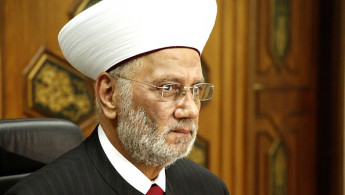Lebanon elects Sunni muftis for first time in 40 years
Elections were held in Lebanon for muftis - Islamic experts qualified to give rulings on religious matters – for the first time in 40 years, according to reports.
A vote for the muftis, who will become dignitaries of Lebanon’s highest Sunni religious body, occurred on Sunday in six regions across the country, Lebanese outlet L’Orient Today reported.
The past four decades have seen the mufti of the republic appoint regional muftis, however this year provided the "right… conditions… for holding elections", Khaldoun Kawas, head of communications of Dar al-Fatwa told L’Orient Today.
The elections, which were called for by the state’s most senior Sunni Muslim cleric Grand Mufti Sheikh Abdul Latif Derian, occurred in Tripoli, Akkar, Zahle, Rashaya, Baalbeck-Hermel and Hasbaya-Marjayoun.
Not everyone is able to vote to select the muftis. The General Directorate of Islamic Waqfs decides who is able to take part in the vote.
Those able to vote include the incumbent Prime Minister, former prime minister, members of the supreme Islamic council, Sunni legal judges, the president of the waqfs, imams, and Sunni members of the constitutional council, according to L’Orient.
Sunni 'first-class' civil servants, Sunni members of municipal councils and Sunni personalities deemed part of the political and religious elite are also able to have their say in the elections.
Sheikh Mohammad Tarek Imam was elected mufti of Tripoli, Sheikh Zaid Mohammad Bakkar Zakaria was elected mufti of Akkar and Sheikh Ali Ghazzaoui was elected mufti of Zahle, according to a statement by Dar al-Fatwa.
Sheikh Wafic Hijazi was elected mufti of Rashaya, Sheikh Ayman Rifai was elected mufti of Baalbeck-Hermel and Sheikh Hassan Dalleh was elected mufti of Hasbaya-Marjayoun.
Caretaker Prime Minister Najib Mikati assured there was "no political interference" in the elections, as he cast his vote in his home city Tripoli, the National News Agency reported.
Though the mufti elections were an apparent success, Lebanon has had no such luck on the political front.
The country is still yet to elect a president as Lebanese legislators have attempted and failed to agree on a new head of state several times since Michel Aoun completed his term.
The extended power vacuum in the already crisis-hit nation, now without a president for almost two months, has prolonged the country's paralysing political stalemate.





 Follow the Middle East's top stories in English at The New Arab on Google News
Follow the Middle East's top stories in English at The New Arab on Google News
![Netanyahu furiously denounced the ICC [Getty]](/sites/default/files/styles/image_330x185/public/2024-11/GettyImages-2169352575.jpg?h=199d8c1f&itok=-vRiruf5)
![Both Hamas and the Palestinian Authority welcomed the ICC arrest warrants [Getty]](/sites/default/files/styles/image_330x185/public/2024-11/GettyImages-2178351173.jpg?h=199d8c1f&itok=TV858iVg)
